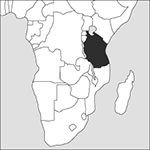
Source: MAPS IN MINUTES™ © RH Publications (1997)
Capital:
Dodoma (many government offices remain in Dar es Salaam, the former capital)
Area:
947,300 sq km (365,755 sq miles)
Population:
48,261,942 (2013 est)
Currency:
1 Tanzanian shilling = 100 cents
Religions (mainland):
Christian 30.0%; Muslim 35.0%; traditional beliefs 35.0%. Zanzibar: more than 99.0% Muslim.
Ethnic Groups (mainland):
African (over 130 tribes) 99.0%. Zanzibar: Arab, African, and mixed race.
Languages:
Swahili, English (both official); Arabic (especially on Zanzibar); local languages
International Organizations:
UN; AU; Commonwealth; Non‐Aligned Movement; SADC; WTO
A country in East Africa, consisting of the former republic of Tanganyika and the island of Zanzibar.
Physical
Tanzania is bounded by Kenya and Uganda on the north, Rwanda, Burundi, and the Democratic Republic of Congo on the west, and Zambia, Malawi, and Mozambique on the south. It has a coast on the Indian Ocean and several islands; Pemba and Zanzibar islands both have a degree of autonomy. A hot, wet coastal plain rises through thick forest and areas planted with sisal to a warm plateau. In the north is Mount Kilimanjaro, below which the soil is volcanic and coffee can be grown. In the extreme north is Lake Victoria, round which cotton is cultivated; the Serengeti National Park is here. Lake Tanganyika along the western border and Lake Malawi in the south, both lie in the western arm of the Great Rift Valley.
Economy
Formerly a socialist economy, Tanzania has almost completed its transition to free-market principles; however, despite recent growth it remains one of the poorest countries in the world. Agriculture is the mainstay of the economy: it employs four-fifths of the workforce and provides significant exports, principally coffee, cashew nuts, and cotton. Gold accounts for around a third of exports, and diamonds, gemstones, and iron are also mined. Other industries include agricultural processing. Natural gas has been discovered offshore.
History
In the first millennium bc northern mainland Tanzania was inhabited by Caucasoid peoples, probably from Egypt. Bantu‐speaking peoples from western Africa moved into the region and were established there by about 500 ad. Arab slave merchants settled along the coast, clashing occasionally with Portuguese explorers, who first arrived in the late 15th century. German missionaries went to Tanganyika (mainland Tanzania) in the 1840s and were followed by German colonists. By 1907 Germany had taken full control of the country. Tanganyika became a British mandate after World War I, and a trust territory, administered by Britain, after World War II. It became independent in 1961, followed by Zanzibar in 1963. The two countries united in 1964 to form the United Republic of Tanzania under its first President, Julius Nyerere. In the Arusha Declaration of 1967 Nyerere stated his policy of equality and independence for Tanzania. In 1975 the Tan–Zam railway line was completed. Tanzania helped to restore democracy in Uganda in 1986 and gave strong support to political exiles from Zimbabwe, Angola, and Namibia. Nyerere was succeeded by President Ndugu Ali Hassan Mwinyi, who was re‐elected in 1990 and whose years in office saw a marked revival of the economy with its very considerable potential. In June 1992 he ended 27 years of one‐party rule by the legalization of opposition parties. During 1994 and 1995, some 800,000 refugees from civil war and ethnic violence in the neighbouring countries of Rwanda and Burundi fled to Tanzania; some Tanzanian politicians called for their repatriation. Internal tensions also grew in this period, particularly in Zanzibar, where the ruling party encountered growing opposition from Islamic fundamentalists. Multiparty elections, held in November 1995, saw the Party for the Revolution retain power, with Benjamin Mkapa becoming the country’s new President. He was re‐elected in 2000 and succeeded in 2005 by Jakaya Kikwete, who was re-elected in 2010. Due to term limits Kikwete was unable to run again in 2015. The Chama Cha Mapinduzi party chose John Magufuli to replace him; Magufuli resoundingly beat Edward Lowassa, a former Prime Minister tainted with corruption allegations, and took office in October 2015. The 2015 elections in Zanzibar which the opposition claimed to have won, were deemed invalid, and the CCM then won the 2016 rerun, which was boycotted by most other parties.
- composition factor
- composition(of a number)
- composition(of functions)
- composition plane
- composition resistor
- composition series
- composition surface
- composition table
- compossibility
- compossibles
- compost
- compound
- compound angle formulae(in hyperbolic functions)
- compound angle formulae(in trigonometry)
- compound bar chart
- compound corals
- compound distribution
- compound document
- compound eye
- compound fraction
- compound interest
- compound magnet
- compound microscope
- compound modulation
- compound nucleus model